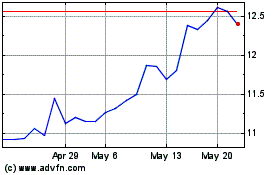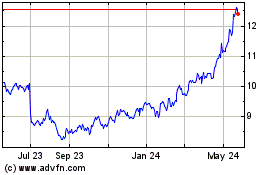Crude Oil Treasure' Turns Toxic For Chinese Bank and Its Small Investors
April 23 2020 - 7:18AM
Dow Jones News
By Xie Yu and Frances Yoon
Oil derivatives sold to Main Street investors, including some
that could be bought with a few clicks on a bank app, have produced
hundreds of millions of dollars of losses in South Korea and
China.
Their plight echoes losses suffered by individual investors in
the U.S., who were also burned by this week's extraordinary price
action, in which one futures contract for West Texas Intermediate
crude plunged below zero.
In China, an investment product known as "crude oil treasure"
could saddle both the bank behind it, Bank of China Ltd., and
end-investors with losses.
And in nearby South Korea, this week's turmoil added to a
difficult year for the country's mom-and-pop investors, who are
avid buyers of complex investment vehicles.
Hyo Seob Lee, senior research fellow at the Korea Capital Market
Institute, estimated local investors have lost the equivalent of
about $1.6 billion this year on products linked to U.S. oil
futures.
Chinese banks have designed commodity-linked products for a few
years, as they innovate to make up for falling profits on
traditional lending, said Wang Hong Ying, director of the China
Financial Derivatives Investment Institute. The banks mainly
benefit from trading commissions.
"Although many of these products are linked to complicated
derivatives like futures, they are promoted among individual
investors as wealth-management products, which do not require savvy
financial knowledge or a minimum investment threshold," he
said.
The oil investment product sold by Bank of China was marketed to
individuals large and small, who could buy or sell it with a few
taps of the bank's mobile app. The minimum investment amount was
the equivalent of about $61, according to a marketing document, and
investors could place bets on price moves in either WTI crude or
Brent. The bank collected fees for facilitating various
transactions.
The trouble for Bank of China's investors came because the life
of one of its products ended on Monday, as futures for May delivery
went negative, a statement from the bank showed. That timing
effectively resulted in holders being cashed out at minus $37.63 a
barrel--meaning whatever they had invested was wiped out.
Bank of China's clients might also be on the hook for more money
than they put into the investments. The product's contract terms
say Bank of China can dip into investors' other accounts with the
bank to make up any shortfall.
Jefferies analysts, citing a screenshot published by Chinese
media, calculated that 3,261 investors owed Bank of China
collectively the equivalent of about $52.2 million. The analysts
said this figure was also consistent with traders' estimates.
However, the bank itself could ultimately incur a loss of
roughly $28 million to $71 million, given the possibility of
lawsuits, arbitration and fines, the Jefferies team said. Bank of
China didn't immediately respond to a request seeking comment. In a
filing, it said it would handle "follow-up matters" in accordance
with laws and regulations.
Rivals such as Industrial & Commercial Bank of China and
China Construction Bank offer similar products, but avoided the
same problem because their products had earlier settlement dates,
according to Jefferies as well as a message from ICBC viewed by The
Wall Street Journal.
In South Korea, some energy-backed investments are part of a
booming, broader market for complex investment vehicles tied to the
prices of assets such as stock indexes or commodities. This is one
leg of a global trade based around market volatility that is known
as "risk recycling."
"Investors in Korea and Hong Kong seem to have a lot of appetite
for risk," said Mr. Lee, the capital-markets researcher.
The equivalent of more than $1.1 billion of so-called structured
notes primarily linked to WTI and to Brent crude, the global oil
benchmark, were outstanding at end-March, according to Korea
Securities Depository data. The majority of those notes were linked
to WTI.
In addition to those exchange-traded notes, rich investors can
also buy derivative-linked securities, which aren't publicly
traded.
As an example, one derivative-linked security sold by Samsung
Securities pays an annual 11.18% coupon for three years, provided
that none of Hong Kong's Hang Seng Index, the European Euro Stoxx
50 index or WTI futures falls more than 50% during the product's
lifetime.
Jing Yang and Grace Zhu contributed to this article.
Write to Xie Yu at Yu.Xie@wsj.com and Frances Yoon at
frances.yoon@wsj.com
(END) Dow Jones Newswires
April 23, 2020 08:03 ET (12:03 GMT)
Copyright (c) 2020 Dow Jones & Company, Inc.
Bank of China (PK) (USOTC:BACHY)
Historical Stock Chart
From Nov 2024 to Dec 2024

Bank of China (PK) (USOTC:BACHY)
Historical Stock Chart
From Dec 2023 to Dec 2024
